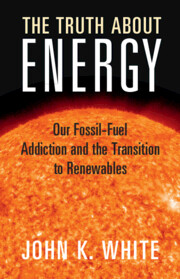The Truth About Energy: Our fossil-fuel addiction and the transition to renewables
John K. White
Softcover, 720 pages, Cambridge University Press (2024)
We are at the beginning of a revolution, as profound as the IT revolution and the advent of the microchip in the 1960s.
The ET or Energy Technology revolution isn't advancing as fast or as easily, however, with an entrenched carbon economy still at the forefront of everyday use, led by an old-world, fossil-fuel industry, despite decreasing oil supplies and the increasing consequences of harmful emissions.
Institutional change comes slowly. Revolutions are disruptive. They change everything.
Prologue
Many trade books on sustainable energy are light on technical details, while engineering and science textbooks are full of equations, theory, and problem sets. In short, textbooks are overly specific, while trade books are too general. The Truth About Energy aims to bridge the gap, giving the reader a comprehensive scientific grounding in modern energy technology without the complex mathematical or theoretical detail.
We look at the basics of power generation using historical examples, taking the reader through each of the main watershed energy technologies since the start of the Industrial Revolution in the mid-eighteenth century - wood, coal, oil, gas, nuclear, hydro, and modern renewables such as biomass, photovoltaics, concentrated solar power, wind, wave, and geothermal. We learn about the mechanics of motive power and distributed energy (especially via solar panels and wind turbines) and look under the hood of today's electric vehicles and rechargeable batteries.
We explain the origin and meaning of common units (watts, joules, kilowatt-hours), compare old power-generating solutions to a burgeoning new energy infrastructure, and examine the many maturing industries competing for our energy needs today. Throughout, we assess the impact of a rapidly changing energy paradigm that sees more renewable-energy power plants, electric vehicles, and green infrastructure come online by the day in a fast-changing modern world, and how to attain a viable and sustainable future, essential to our well-being as we approach geological limits to resources and increased global warming. Along the way, we discover the main players at the forefront of a growing green revolution and the well-financed opposition who want to maintain a lucrative status quo.
Despite the many advances in recent years, renewables are not well understood, nor are the latest petroleum extraction methods that continue to fuel our expanding power needs such as offshore drilling, shale gas, and oil sands. And while the age of oil has produced an unparalleled explosion of people and power where global population has more than quadrupled to almost 8 billion in under 200 years, the three major revolutions of the twenty-first century will be renewable energy, electric vehicles, and storage batteries. Each will become cheaper, longer-lasting, and ubiquitous just as power stations, electric light, and the gasmobile did over a century ago. None of us can afford to be caught out in the transition.
As part of the analysis, I include old-world, dirty technologies (Part I). Why include coal, oil, and nuclear power in a book that champions renewable energy (Part II)? Firstly, they have created our modern industrial world and will continue to produce more energy for decades to come. Secondly, one has to know the lingo to understand why some seek to slow the change. Armed with knowledge of the past and the mistakes we have made along the way, we can step boldly into a new future, and demand the energy we want and need.
We must become better informed about the basics of energy and power as we transition from brown to green, wobbling through the extraordinary changes that lie ahead. At the same time, it is important to see how to make a difference with simple, smart decisions about our own energy needs and consumptive lifestyle (Part III). We have no choice but to find more efficient ways to generate power for electricity, heat, and travel, recognizing that clean, sustainable energy is the only way forward for a warming planet with finite resources.
About the author
Dr. John K. White is a physicist, writer, and educator, who has worked in the engineering, science, and education fields in Canada, the Netherlands, Ireland, and Spain.
He has written numerous articles, technical documents, and manuals and taught courses in physics, computing, and science education over a 40-year career in industry, government, and academia.
He is the author of
Do the Math! On Growth, Greed, and Strategic Thinking, which promotes better numeracy through everyday examples, and has written for
CounterPunch,
Caracolas, and various physics journals.
He is a former lecturer in the School of Physics, University College Dublin, and Department of Education Sciences at the University of Oviedo.
The Truth About Energy: Our fossil-fuel addiction and the transition to renewables
John K. White
Softcover, 720 pages, Cambridge University Press (2024)
We are at the beginning of a revolution, as profound as the IT revolution and the advent of the microchip in the 1960s.
The ET or Energy Technology revolution isn't advancing as fast or as easily, however, with an entrenched carbon economy still at the forefront of everyday use, led by an old-world, fossil-fuel industry, despite decreasing oil supplies and the increasing consequences of harmful emissions.
Institutional change comes slowly. Revolutions are disruptive. They change everything.

